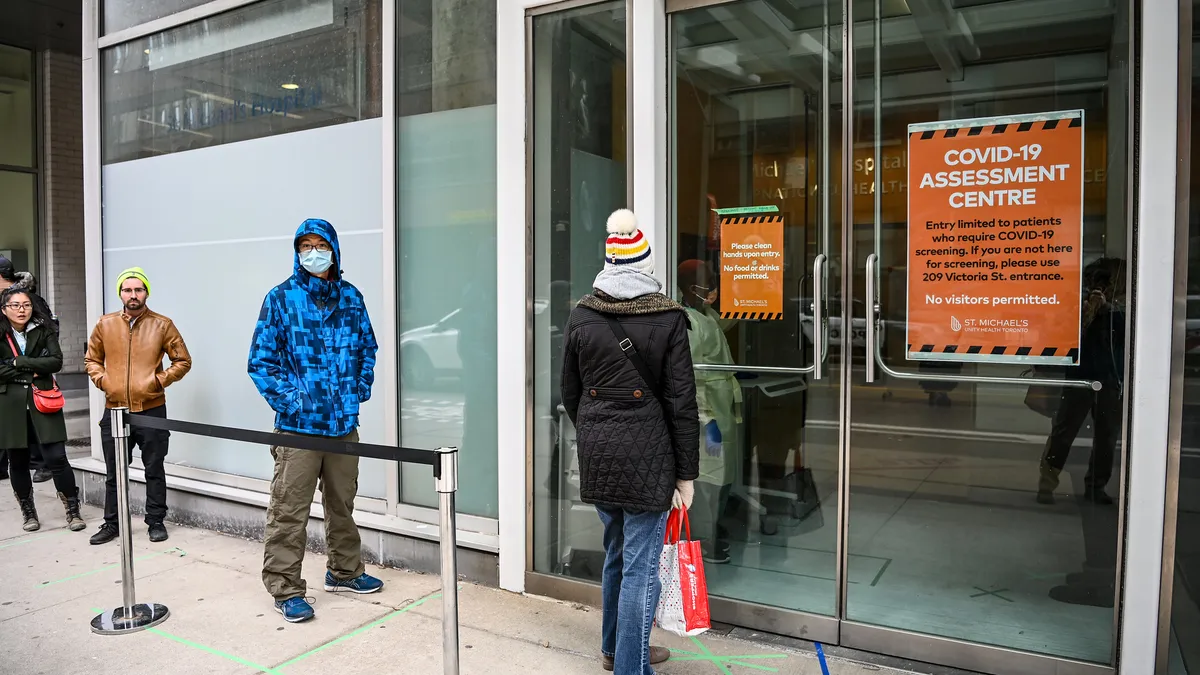Dive Brief:
- Quidel late Thursday announced second quarter revenue of $201.8 million, an 86% increase compared to the same period last year, fueled by strong demand for its Sofia SARS Antigen and Lyra SARS-CoV-2 molecular tests.
- The company's point-of-care antigen test, which in May became the first such diagnostic to receive FDA emergency use authorization, brought in $56.3 million in revenue helping Quidel's rapid immunoassay product sales to jump 270% in the quarter to $80.6 million. The Lyra SARS-CoV-2 assay, which first received an EUA in March, captured $52.7 million in sales for the quarter.
- CEO Doug Bryant told analysts demand for the company's antigen test "continues to be strong, sustained, and frankly more than we can satisfy." Based in part on the current demand for Quidel's antigen test, Bryant projected that third quarter revenue will be at least $375 million.
Dive Insight:
The pandemic has afforded an unexpected growth catalyst of big proportions for Quidel, whose stock price has nearly tripled since the start of the second quarter.
While Quidel has not historically provided quarterly or annual guidance, Bryant told investors on Thursday in making the third quarter $375 million forecast that the company recognizes the "difficulty all this growth is creating for analysts trying to model revenue and EBITDA over the next few quarters." Going forward, he made the case that a "revenue floor that reflects a high confidence of achievement might be useful."
Quidel shared new data July 17 showing its antigen test had 96.7% sensitivity within five days of the onset of COVID-19 symptoms, comparable to the sensitivity rates of polymerase chain reaction (PCR) tests.
Earlier this month, FDA granted an EUA to a BD antigen test with 84% sensitivity, making it only the second such diagnostic after Quidel to receive the agency's nod. However, with 96.7% sensitivity, William Blair analysts in a July 20 note concluded that Quidel's antigen test appears to be best-in-class at this point, with Abbott still in the process of developing its own such diagnostic.
"We think this opens up more of the testing market for the company and should act as another meaningful differentiator against other antigen players like BD and potentially Abbott. That is not to say this test will erode the opportunity for BD or maybe even Abbott in the near term, as those manufacturers are likely to sell everything they make as well," wrote the analysts.
While the Quidel antigen test's sensitivity data may increase demand for the diagnostic, the analysts also noted there is little it can do to expand manufacturing capacity above the more than 1 million tests per week that are currently being produced.
"Heading into next month this number should trend closer to 1.5 million with even more expansion on the way, but again, capacity will be the limiting factor for Quidel — not demand," according to the analysts.
Nonetheless, Bryant told investors on Thursday's call that the company anticipates continued growth over the coming months and is actively working to increase its manufacturing scale by expanding facilities, hiring additional personnel and asking more of the supply chain.
One thing that could help: Quidel announced Friday it's ironing out plans for a one-year, $71 million contract from the National Institutes of Health to support greater manufacturing capacity in San Diego, with a goal of finalizing an agreement by mid-September. Those funds would help expand Quidel's test cassette capacity from 84 million per year to 220 million and support a larger distribution center for COVID-19 assays as well as diagnostics for other infectious diseases.
Quidel's pipeline includes a serology assay that Bryant contends could provide "better clinical utility than the current tests in market." Also under development is a rapid combination diagnostic to detect the coronavirus and the A and B forms of influenza. "Because the assay uses the same manufacturing lines as our Sofia flu and Sofia antigen tests the combo test can potentially increase our manufacturing capacity, especially as we enter into the crucial winter months," Bryant said.
Earlier this month, FDA granted an EUA to a combination diagnostic from the Centers for Disease Control and Prevention designed to determine if a patient is infected with influenza or the novel coronavirus. The agency has also authorized similar dual purpose tests from BioFire Diagnostics and Qiagen.
Last month, Quidel announced it received $635,000 from the Biomedical Advanced Research and Development Authority (BARDA) to fund the development of a point-of-care assay that can test for SARS-CoV-2, Influenza A, Influenza B, and Respiratory Syncytial Virus (RVP). Ultimately, the goal is to apply for an EUA for the test.
In addition, Bryant reported that all of Quidel's key non-COVID-19 product development efforts remain on track. The company in the fall intends to submit 510(k) packages to FDA for Sofia Strep 98 and Sofia RVP.











